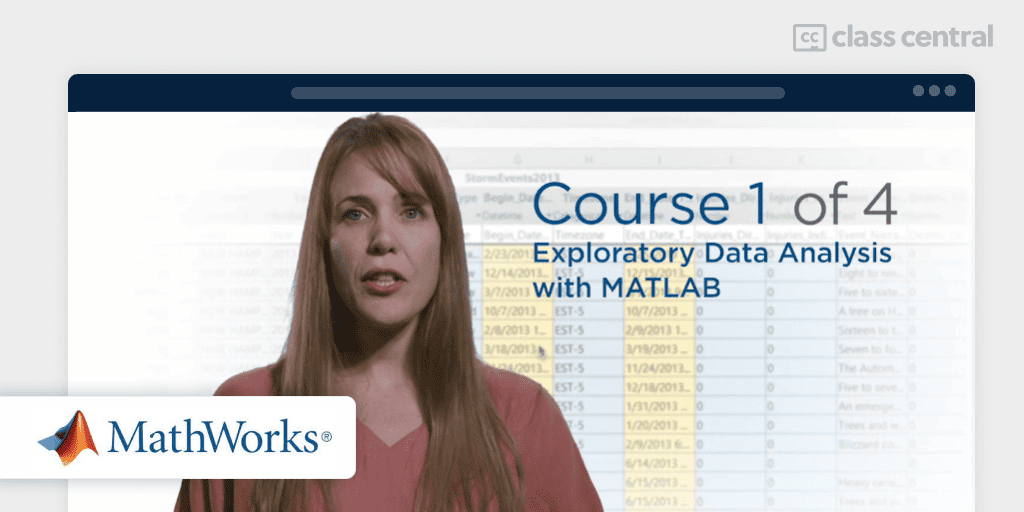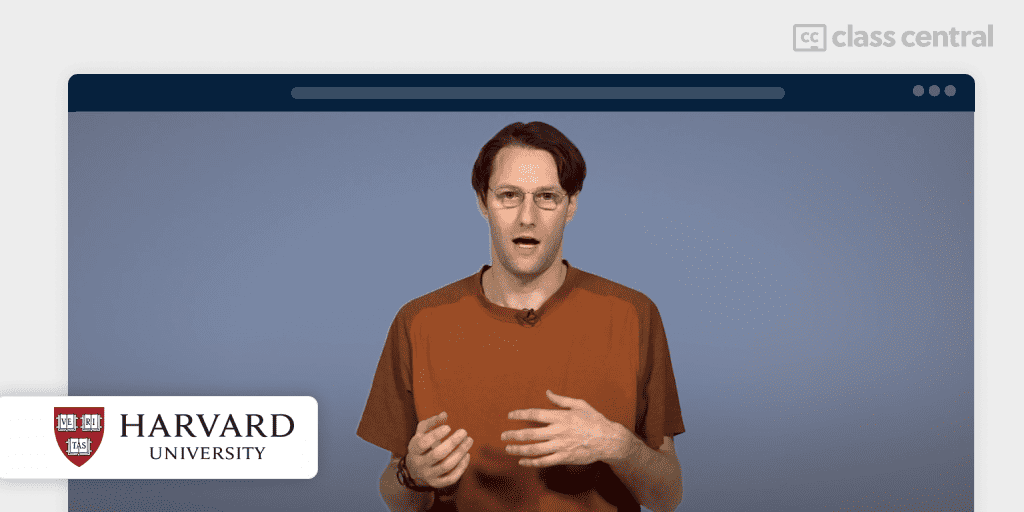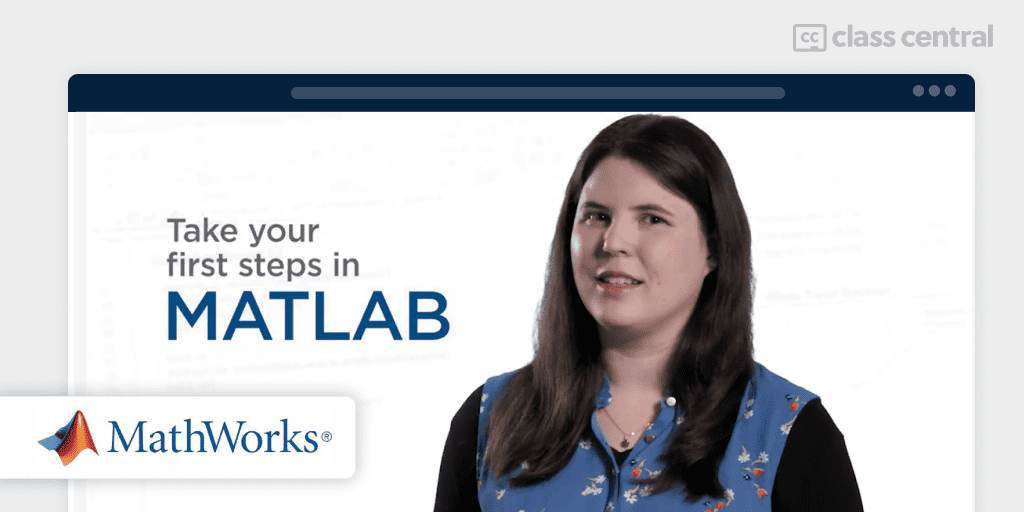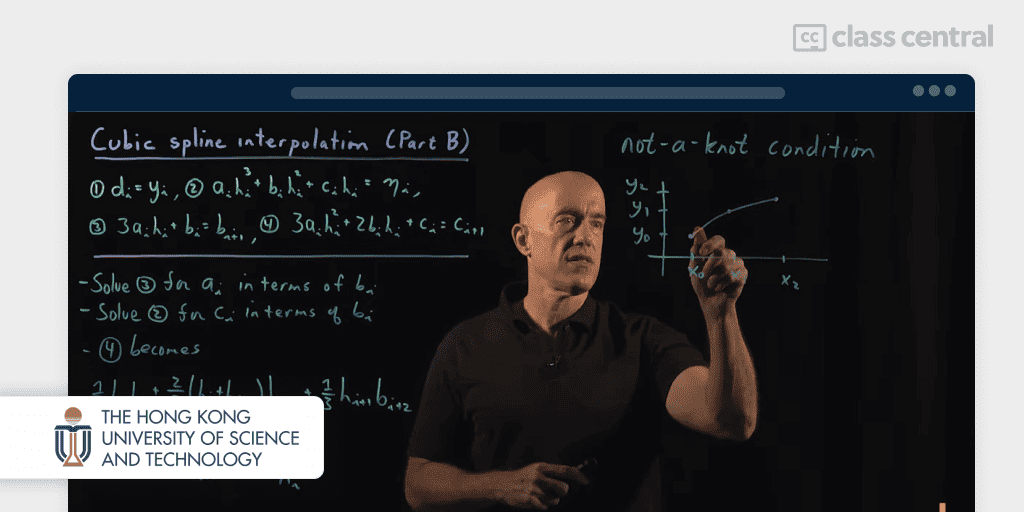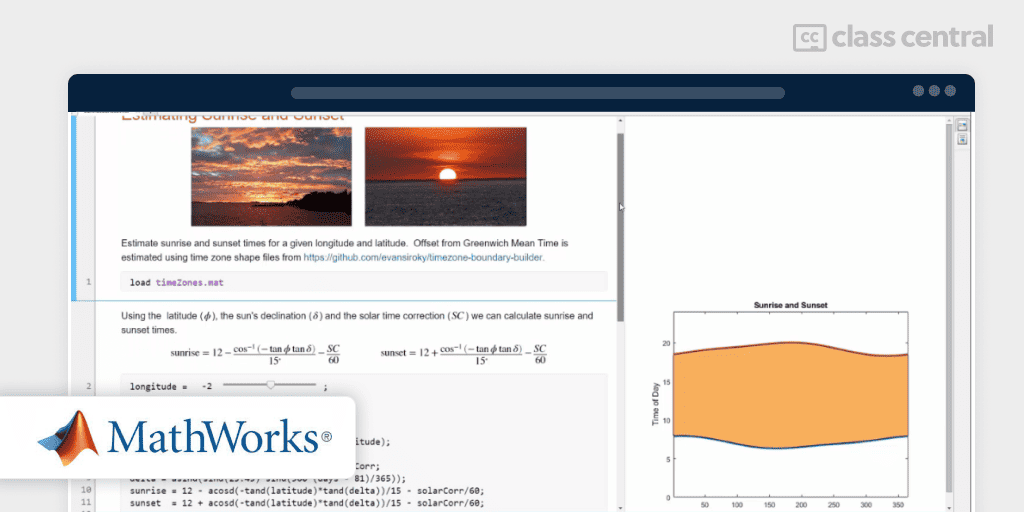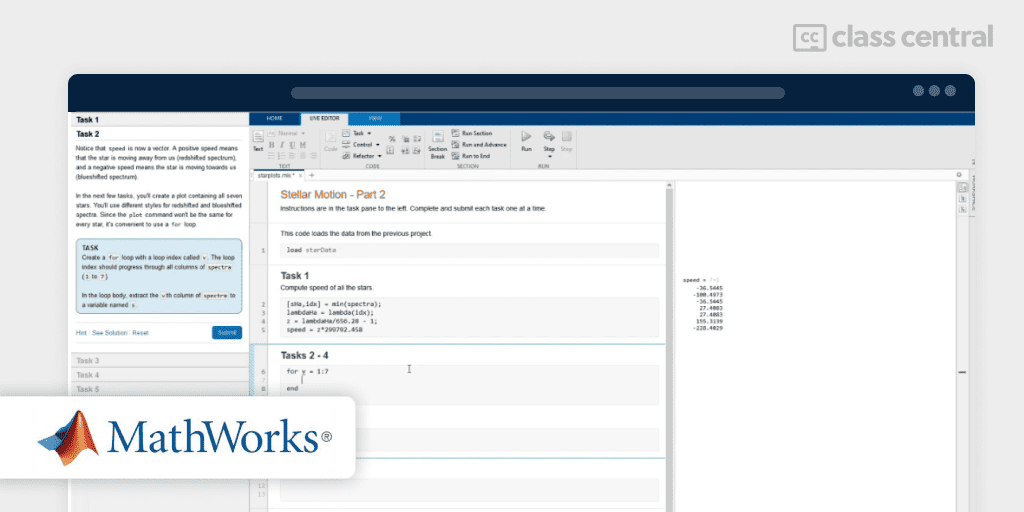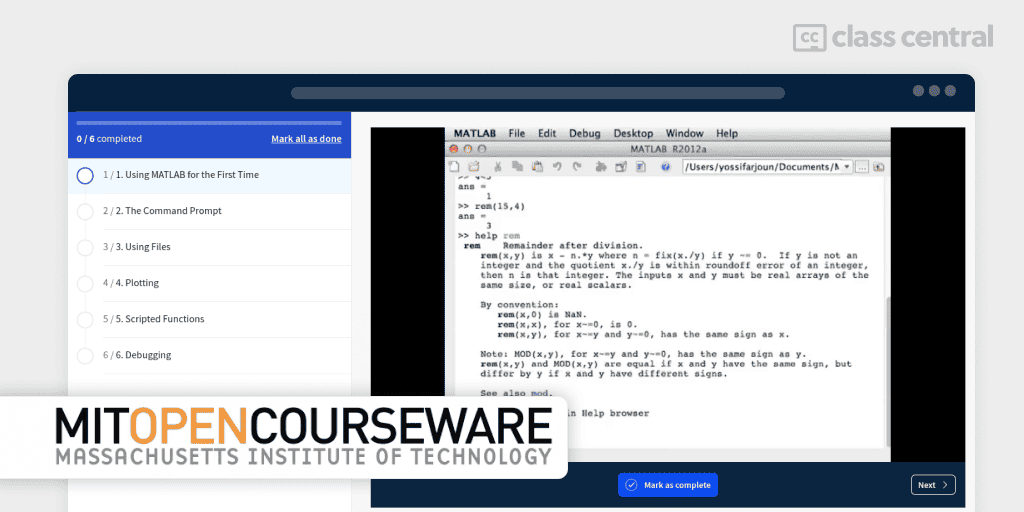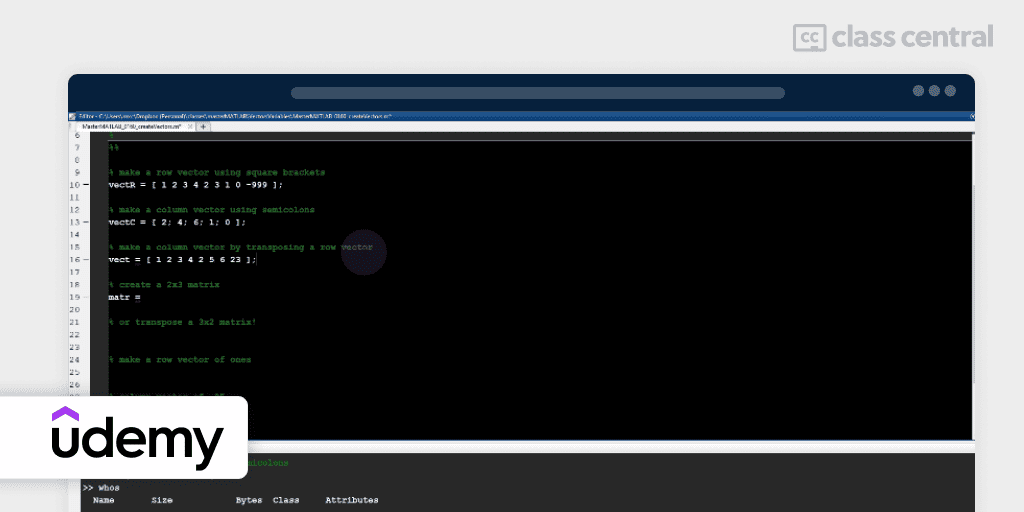10 Best MATLAB Courses for 2024: Algorithms and Applications
Master Matlab: Unlock the power of Scientific Computing and Data Visualization with these top free and paid online courses.
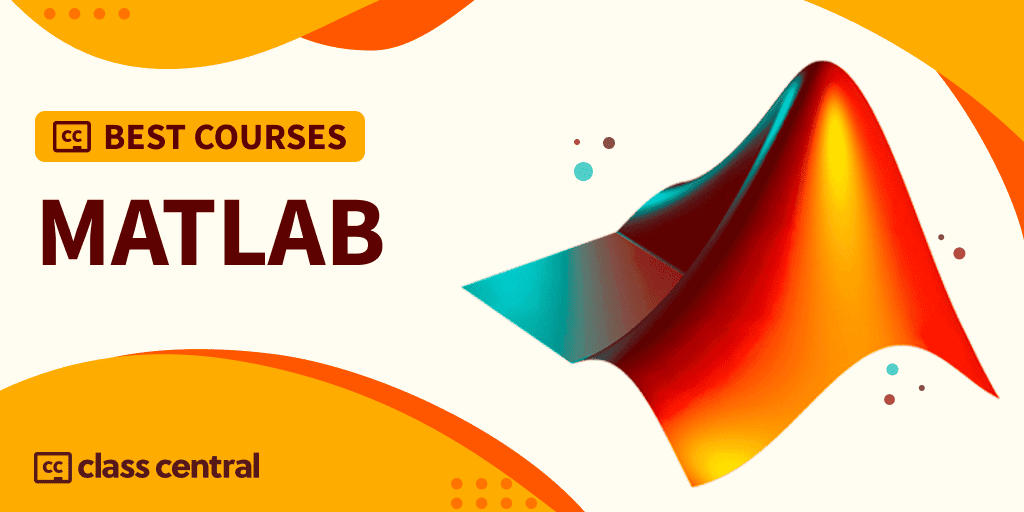
In this article I’ve selected the best free and paid online courses to learn MATLAB based on MATLAB courses from the Class Central catalog. Most of the courses are free or free-to-audit, and four courses are provided by MathWorks, the maker of MATLAB. There are courses for complete beginners plus options for more advanced users and specific fields such as medicine, biology, and engineering.
Click on the shortcuts for more details:
Here are my top picks. Click on one to skip to the course details:
| Course Highlight | Workload |
| Best for STEM Oriented Beginners to Programming (Vanderbilt) | 35 hours |
| Best for Data Scientists (MathWorks) | 20 hours |
| Best for Medicine or Biology Students (Harvard) | 30–50 hours |
| Best for General MATLAB Programming (MathWorks) | 16–28 hours |
| Best for Engineers (HKUST) | 42 hours |
| Best Concise Introductory MATLAB Course (MathWorks) | 2 hours |
| Best for More Experienced Learners (MathWorks) | 17 hours |
| Old but Gold MATLAB Course (MIT) | 1–2 hours |
| Best LinkedIn Learning Course (LinkedIn Learning) | 1–2 hours |
| Best Advanced MATLAB Programming Course (Udemy) | 38 hours |
What is MATLAB?
MATLAB, short for Matrix Laboratory, is a high-level programming environment designed specifically for the needs of scientists and engineers. It is used among engineers, scientists, and academics as it allows analysts to work efficiently with large amounts of data.
The design of the language enables powerful but simple programs to be written and solve complex tasks. Often, MATLAB scripts are just a few lines long, while other high-efficiency programming languages like C++ or Java can take several pages of code, which is why MATLAB is one of the top 20 most popular programming languages in the world, according to the TIOBE Index. Additionally, Glassdoor states that MATLAB Engineers on average make $111K annually.
Stats
- Together, the courses in this ranking account for 950K enrollments
- Most of the courses are beginner level
- 4 of the courses on this list are made by MathWorks, the company behind MATLAB itself
- Around 5.4K people are following the MATLAB Subject on Class Central.
Best for STEM Oriented Beginners to Programming (Vanderbilt University)
My pick for the best MATLAB course is Introduction to Programming with MATLAB by Vanderbilt University.
Featured in our Best Online Courses of All Time list, this free-to-audit course is targeted towards engineers or scientists with little to no coding experience who want to get started programming in MATLAB, either for school or work. By the end of the course, you’ll have a deep and comprehensive understanding of MATLAB and programming.
Students taking the course will get a MATLAB online license free of charge for the duration of the course.
You’ll learn about:
- MATLAB environment and user interface
- Using MATLAB as a sophisticated calculator and creating plots
- Working with matrices as the basic unit of MATLAB
- Matrix manipulation using operators, defining and combining matrices
- Creating and using functions for problem-solving
- Built-in MATLAB functions including polymorphism and random number generation
- Input/output operations, plotting graphs, and using MATLAB’s debugger
- Controlling program flow with selections and loops
- Studying 15 fundamental data types in MATLAB
- Describing ten types of numbers and converting between them
- Exploring strings, structs, cells, and storing time-related data
- Introduction to MATLAB’s file reading and writing methods
- Handling MAT files, Excel files, text files, and binary files
- MATLAB commands to navigate through folders.
You’ll learn primarily from video lectures and working on the programming assignments and quizzes that’ll test your knowledge of MATLAB. If you are paying for the certificate, you’ll also have access to the graded problems that count towards your certificate.
| Institution | Vanderbilt University |
| Part of | MATLAB Programming for Engineers and Scientists Specialization |
| Provider | Coursera |
| Instructors | Akos Ledeczi, Michael Fitzpatrick, and Robert Tairas |
| Level | Beginner |
| Workload | 35 hours |
| Enrollments | 481K |
| Rating | 4.8 / 5.0 (17K) |
| Certificate | Paid |
Best for Data Scientists (MathWorks)
Exploratory Data Analysis with MATLAB is on the Best Online Courses of all Time list.
In this free-to-audit course, you’ll develop practical skills for exploring data with MATLAB that you can apply to your daily work. By the end, you’ll be equipped with the MATLAB programming skills needed to import, visualize, perform standard statistical analysis on your data, and share interactive documents to communicate your results with others.
No programming background is required to take this course. But, you should have some knowledge of basic statistics (e.g., histograms, averages, standard deviation, curve fitting, interpolation).
Students taking the course will get a MATLAB Online license free of charge for the duration of the course.
In this course, you’ll:
- Be introduced to data science, learn how to explore data, formulate questions, and use Live Scripts for analysis
- Understand data representation, import data into MATLAB efficiently, and generate reusable code for future data imports
- Filter and visualize data subsets, create standard graphs, maps, and other visualizations for practical insights
- Perform statistical analysis beyond spreadsheets, iterating through operations on different data groups for exploration and experimentation
- Bring together filtered and visualized data to create a compelling narrative using Live Scripts, emphasizing broader aspects of data science beyond coding and number crunching.
You’ll learn primarily by watching the lecture videos, reading the course articles, sharing thoughts and ideas in discussion prompts, completing the ungraded practice quizzes and MATLAB programming exercises, and participating in the Coursera forums.
If you are paying for the certificate, you’ll also have access to the weekly quizzes and graded programming exercises including a final peer-graded assignment where you’ll analyze a weather data set for an insurance company and share your insightful findings with other learners.
| Institution | MathWorks |
| Part of | Practical Data Science with MATLAB Specialization |
| Provider | Coursera |
| Instructors | Michael Reardon, Cris LaPierre, Erin Byrne, Adam Filion, Heather Gorr, Nikola Trica, Maria Gavilan-Alfonso, and Brandon Armstrong |
| Level | Beginner |
| Workload | 20 hours |
| Enrollments | 38K |
| Rating | 4.8 / 5.0 (792) |
| Certificate | Paid |
Best for Medicine or Biology Students (Harvard University)
Quantitative Methods for Biology is for anyone looking for an introduction to MATLAB, be they medical students who need MATLAB for their job, or programmers interested in the medical field. But you’ll need some knowledge of introductory algebra.
This free-to-audit 10 weeks of limited access course provides beginners learning to code with the fundamentals of MATLAB programming. It is also suitable for expert programmers, it’ll teach you MATLAB essentials without getting slowed down by introductory concepts you already know.
Students taking the course will get a MATLAB Online license free of charge for the duration of the course.
This course covers:
- Introduction to MATLAB: basics of writing, reading, and explaining MATLAB code for problem-solving
- Array manipulation: multidimensional arrays with applications in image analysis for medical and cellular biology
- Loops: control operations, including nested loops, variable scoping, if statements, and loop termination
- Functions and scripts: create reusable code, custom functions, and scripts to be called from anywhere without rewriting
- Data analysis: explore statistical techniques such as data summarization, visualization using graphs and histograms, and handling missing values in real-world data.
Learn by watching the lecture videos, reading the course material, participating in the discussion forum, completing the practice exercises and the final project. If you are paying for the course, you’ll have access to the graded problems.
Dr. Michael Springer is a professor at Harvard Medical School, where his lab studies how evolution shapes and constrains the way in which organisms respond to their environment.
| Institution | Harvard University |
| Provider | edX |
| Instructor | Michael Springer |
| Level | Beginner |
| Workload | 30–50 hours |
| Enrollments | 60K |
| Rating | 4.5 / 5.0 (6) |
| Certificate | Paid |
Best for General MATLAB Programming (MathWorks)
With no prerequisites, MATLAB Essentials aims to provide you with the essential MATLAB programming skills needed to process, analyze, and visualize data.
In this course with free limited access, you’ll answer tricky real-world questions like ‘How does the magnitude of an earthquake impact the strength of a tsunami?’ and ‘How far does a blue whale swim each day?’.
By the end of the course, you’ll be ready to analyze your own data sets and impress colleagues with word clouds, geographic plots, animations, and more. Additionally, you’ll have the skills needed to prepare for the MathWorks Certified MATLAB Associate exam to set you apart in the job market. MathWorks is the leading developer of mathematical computing software and of this course.
Students taking the course will get a MATLAB Online license free of charge for the duration of the course.
You’ll learn about:
- Numeric data and vectors as foundational elements for MATLAB analyses
- Handling numeric and non-numeric tabular data, including working with two-dimensional tables
- Exploratory data analysis tools for importing diverse data, analysis, and visualization of 2D, 3D, geographic, text, and time-series data
- Utilizing conditionals and loops for repetitive analyses and understanding the significance of code reuse
- App design: Creating a MATLAB app to customize user interaction with blue whale tracking data, concluding the course.
Watch the lecture videos and practice your newly acquired skills through auto-graded assignments, practice quizzes, interactive readings, and projects.
| Institution | MathWorks |
| Provider | edX |
| Instructors | Brian Buechel, Tugce Kasikci, Pragya Lakhotia, Brian Neiswander, Megan Thompson, and Nikola Trica |
| Level | Beginner |
| Workload | 16–28 hours |
| Enrollments | 20K |
| Certificate | Paid |
Best for Engineers (The Hong Kong University of Science and Technology)
If you’re an engineering student learning MATLAB to solve mathematical equations, this free-to-audit course is specially designed for you. Numerical Methods for Engineers covers the MATLAB basics of scientific computing that an engineer should know. You’ll cover basic algorithms in root finding, matrix algebra, integration and interpolation, ordinary and partial differential equations, solving them using MATLAB.
To take this course, you’ll need to be familiar with the basics of matrix algebra, differential equations, and vector calculus, as well as have previously studied a programming language. The course is part of the Mathematics for Engineers Specialization.
Students taking the course will get a MATLAB Online license free of charge for the duration of the course.
What you’ll learn:
- Fundamentals: understanding computer number representation and writing basic numerical programs in MATLAB
- Root-finding algorithms for cases without analytical solutions, analyzing performance, and solving ODE boundary value problems
- Numerical matrix algebra: Solving linear equations, determining algorithm speed through operation counts, computing eigenvalues/eigenvectors, and solving nonlinear equations for PDEs
- Quadrature and interpolation: Standard methods in MATLAB for definite integrals, and learning linear and cubic spline interpolation
- Ordinary Differential Equations (ODEs): Basic methods, including Runge Kutta methods, solving initial value and two-point boundary value problems with MATLAB’s ode45.m
- Partial Differential Equations (PDEs): Applying matrix algebra to solve linear equations, exploring iterative methods, and understanding basic stability concepts.
You’ll learn from a combination of short lectures, practice problems, and practice programs. Paying learners will wrap up each week with a graded quiz and a programming project to test your understanding of the material.
Jeffrey R. Chasnov is a Professor of Mathematics at the Hong Kong University of Science and Technology, who has authored numerous research articles in fluid turbulence and mathematical biology.
| Institution | The Hong Kong University of Science and Technology |
| Provider | Coursera |
| Instructor | Jeffrey R. Chasnov |
| Level | Beginner |
| Workload | 42 hours |
| Enrollments | 11K |
| Rating | 4.9 / 5.0 (173) |
| Certificate | Paid |
Best Concise Introductory MATLAB Course (MathWorks)
MATLAB Onramp covers the basics of MATLAB in under 2 hours! This introductory tutorial will teach you the commonly used features and workflow in MATLAB and show you some real-world applications of MATLAB. A cool thing about this course is that you’ll be interacting with a web-based version of MATLAB inside their training environment, no installation required!
This course is freely accessible to anyone with a MATLAB account. No prior knowledge of MATLAB is required.
This course covers:
- Introduction to fundamental MATLAB commands, variables, built-in functions, and constants
- Familiarization with MATLAB desktop and editor for writing, saving, and debugging programs
- Exploration of vectors and matrices, including modification, manipulation, and function calls
- Emphasis on importing and visualizing data, followed by hands-on projects to apply acquired skills
- Final project uses MATLAB to analyze recorded light from a star, determining its motion relative to Earth.
You’ll learn by watching the lecture videos and coding hands-on in the web-based MATLAB environment to complete the tasks and projects.
MATLAB Academy offers many interactive self-paced online courses and tutorials on Deep Learning, Machine Learning, and many more.
Renee Bach is an online course developer at MathWorks who studied computer science at Georgia Tech. She creates learning content focused on using MATLAB for signal processing and artificial intelligence.
| Institution | MathWorks |
| Provider | MATLAB Academy |
| Instructor | Renee Bach |
| Level | Beginner |
| Workload | 2 hours |
| Certificate | Paid |
Best for More Experienced Learners (MathWorks)
MATLAB Fundamentals is the successor of the previous course. Here, you’ll dive deeper and learn the core MATLAB concepts and functionality for data analysis, visualization, modeling, and programming.
Just like the last course, you’ll be interacting with a web-based version of MATLAB inside their training environment, no installation required!
This course is freely accessible to anyone with a MATLAB account. To take this course, you should have taken the previous course or have some experience with MATLAB.
In this course:
- Walkthrough the MATLAB desktop environment and implement a standard MATLAB analysis workflow
- Import data from various sources, process, and perform calculations using arrays
- Create meaningful 2D and 3D graphs to enhance data understanding
- Work with tables to organize and handle specialized data types, and preprocess data for tasks including smoothing and polynomial fitting
- Write MATLAB programs with user interaction, decision-making, and adaptability
- Create user-defined functions for code reuse, automation, and troubleshooting/debugging techniques.
Watch the lecture videos and code hands-on in the web-based MATLAB environment by completing the activities. Two review projects help tie up and strengthen what you’ve learnt throughout the course. The course is also available in a classroom format.
Erin Byrne is a training course developer at MathWorks. She has been developing MATLAB learning content for core programming skills, computational math, and workflows for data analytics, machine learning, and image processing.
| Institution | MathWorks |
| Provider | MATLAB Academy |
| Instructor | Erin Byrne |
| Level | Intermediate |
| Workload | 17 hours |
| Certificate | Paid |
Old but Gold MATLAB Course (Massachusetts Institute of Technology)
Introduction To MATLAB Programming is an old but still valuable MATLAB course. It is intended to assist undergraduates with learning the basics of programming in general and MATLAB in particular. No prior programming experience is required to take this course.
By the end of this free course, you’ll know enough about MATLAB programming to have no problem exploring MATLAB and other programming languages in depth on your own.
What you’ll learn:
- MATLAB interface and its purpose, focusing on command prompt usage
- Programming fundamentals: variables, arrays, conditional statements, loops, and functions
- Application of programming concepts to imported data, including plotting and data visualization
- Introduction to scripts for code reuse in repetitive tasks
- Conclude with a focus on debugging, an essential skill for programmers.
Learn by watching the lecture videos, reading through the course articles, and working your way through the projects.
Yossi Farjoun is an applied mathematician and programmer, highly experienced in modeling, numerical simulation, and optimization, now working as a Principal Computational Biologist at Fulcrum Genomics LLC.
| Institution | Massachusetts Institute of Technology |
| Provider | MIT OpenCourseWare |
| Instructor | Yossi Farjoun |
| Level | Beginner |
| Workload | 1–2 hours |
| Certificate | None |
Best LinkedIn Learning Course (LinkedIn Learning)
In this short course with 10 days free trial, you’ll learn MATLAB from the ground up. You’ll harness the MATLAB tools to create programs that model your own data and hypotheses.
No programming experience is needed to take this course.
In this course, you will learn:
- An overview of the MATLAB interface
- Core MATLAB syntax: creating variables, cell arrays, and scripts, working with matrices, and understanding control flow
- Programming tasks: creating custom functions, importing data from CSV files, and debugging broken code
- Data visualization: creating 2D or 3D plots, adding annotations and images
- Introduction to Simulink, MATLAB’s block diagram tool.
You’ll learn primarily by watching the lecture videos and completing the exercise files provided.
Steven Moser, PhD, is an experienced educator, engineer, and content producer. He works with authors to create courses in the Technology segment.
| Provider | LinkedIn Learning |
| Instructor | Steven Moser |
| Level | Beginner to Intermediate |
| Workload | 1–2 hours |
| Enrollments | 318K |
| Certificate | Paid |
Best Advanced MATLAB Programming Course (Udemy)
If you have some experience with MATLAB but want to advance your MATLAB programming skills, then Master MATLAB through Guided Problem Solving is for you!
You’ll gain experience with real-world applications including signal processing, matrix decompositions, spectral analysis, linear and nonlinear model-fitting, and statistics. You’ll also complete data science projects in MATLAB.
To get the most out of this course, you should have some basic exposure to MATLAB or a programming language.
You will:
- Review MATLAB basics, including loops, functions, and I/O
- Practice small projects translating formulas into MATLAB code and learning descriptive statistics
- Plot beautiful 2D and 3D graphs, animation, image and time-series segmentation
- Learn GUI creation for user interaction and input
- Cover calculus, differential equations, and cleaning/analyzing univariate and multivariate time series datasets
- Linear algebra: eigendecomposition, orthogonalization, principal components analysis, and generation of fractal time series and images
- Conclude with discussions on non-parametric statistics and non-linear model fitting.
You’ll learn primarily by watching lecture videos, going through the course programming exercises provided, and participating in the Q&A forums. And if you are wondering, the instructor is active and answers questions there.
Mike X Cohen is a neuroscientist (brain scientist) and associate professor at the Radboud University in the Netherlands. He has over 20 years of experience teaching programming, data analysis, signal processing, statistics, linear algebra, and experiment design.
He has over 160K students and 20 courses on Udemy, ranging from Python to linear algebra.
| Organization | Tim Buchalka’s Learn Programming Academy |
| Provider | Udemy |
| Instructor | Mike X Cohen |
| Level | Intermediate |
| Workload | 38 hours |
| Enrollments | 23K |
| Rating | 4.8 / 5.0 (3.9K) |
| Certificate | Paid |
Why You Should Trust Us
Class Central, a Tripadvisor for online education, has helped 60 million learners find their next course. We’ve been combing through online education for more than a decade to aggregate a catalog of 200,000 online courses and 200,000+ reviews written by our users. And we’re online learners ourselves: combined, the Class Central team has completed over 400 online courses, including online degrees.
Best Courses Guides Methodology
I built this ranking following the now tried-and-tested methodology used in previous Best Courses Guides. It involves a three-step process:
- Research: I started by leveraging Class Central’s database. Then, I made a preliminary selection of 120+ MATLAB courses by rating, reviews, and bookmarks.
- Evaluate: I read through reviews on Class Central, Reddit, and course providers to understand what other learners thought about each course and combined it with my own experience as a learner.
- Select: Well-made courses were picked if they presented valuable and engaging content and they have to fit in a set of criteria and be ranked accordingly: comprehensive curriculum, selling price, release date, ratings and enrollments.
Pat revised the research and the latest version of this article.





